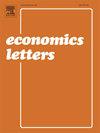社交媒体广告与宏观经济预期:来自Meta的证据
IF 1.8
4区 经济学
Q2 ECONOMICS
引用次数: 0
摘要
我们研究了社交媒体广告与宏观经济预期之间的关系。我们发现有证据表明,社交媒体广告定向会导致不同人群对情绪和经济问题的不同暴露。此外,我们发现有证据表明,社交媒体广告会影响人们对宏观经济的看法,尤其是对通胀预期的看法,尽管这一结果是由35岁至44岁的女性推动的。本文章由计算机程序翻译,如有差异,请以英文原文为准。
Social media advertising and macroeconomic expectations: Evidence from Meta
We examine the relationship between social media advertising and macroeconomic expectations. We find evidence that social media advertising targeting results in heterogeneous exposure to sentiment and economic issues by demographic. In addition, we find evidence that social media advertising affects beliefs about the macroeconomy, particularly inflation expectations, although this result is driven by women between 35 and 44 years of age.
求助全文
通过发布文献求助,成功后即可免费获取论文全文。
去求助
来源期刊

Economics Letters
ECONOMICS-
CiteScore
3.20
自引率
5.00%
发文量
348
审稿时长
30 days
期刊介绍:
Many economists today are concerned by the proliferation of journals and the concomitant labyrinth of research to be conquered in order to reach the specific information they require. To combat this tendency, Economics Letters has been conceived and designed outside the realm of the traditional economics journal. As a Letters Journal, it consists of concise communications (letters) that provide a means of rapid and efficient dissemination of new results, models and methods in all fields of economic research.
 求助内容:
求助内容: 应助结果提醒方式:
应助结果提醒方式:


